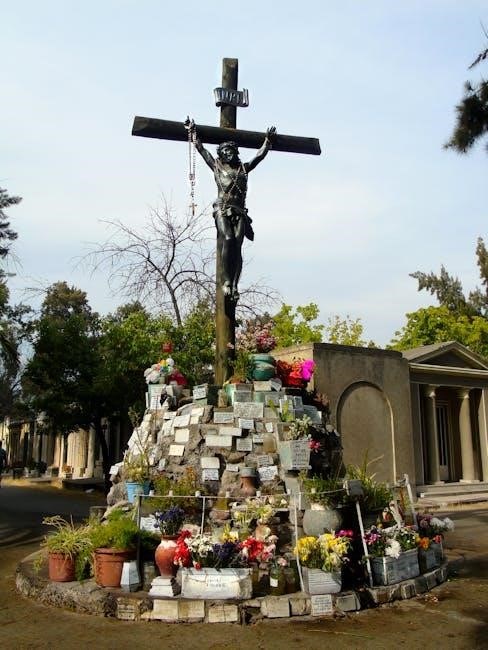Church bylaws are essential documents outlining governance‚ structure‚ and operational guidelines‚ ensuring alignment with biblical principles and legal requirements. They provide clarity on membership‚ leadership‚ and decision-making processes‚ serving as a foundational framework for effective church management and ministry operations.
Importance of Bylaws in Church Governance
Church bylaws are crucial for establishing clear governance‚ ensuring alignment with biblical principles and legal standards. They provide a structured framework for decision-making‚ roles‚ and responsibilities‚ fostering accountability and order. Bylaws protect the church’s integrity‚ prevent conflicts‚ and ensure operations remain consistent with its mission. They also safeguard the rights of members and leaders‚ promoting transparency and trust. Regular reviews and updates are essential to maintain relevance and effectiveness in governance.
Overview of Sample Church Bylaws PDF
A sample church bylaws PDF provides a comprehensive template for governing church operations‚ ensuring alignment with biblical principles and legal requirements. These documents typically include sections on membership‚ leadership roles‚ financial management‚ and decision-making processes. They also outline the church’s purpose‚ structure‚ and operational guidelines‚ offering customizable frameworks for various denominations and church sizes. Using a sample PDF ensures consistency‚ clarity‚ and compliance with nonprofit standards‚ making it an invaluable resource for effective church governance.
Purpose and Nature of the Church
The church’s purpose is to fulfill Christ’s mission through structured ministries‚ fostering relationships with other churches‚ and adhering effectively to biblical principles and legal standards.
Statement of Faith and Mission
The church’s statement of faith outlines its core beliefs‚ rooted in biblical teachings‚ guiding its mission to spread the Gospel‚ nurture believers‚ and serve the community.
The mission reflects a commitment to fulfilling Christ’s purpose through structured ministries‚ fostering interdependent relationships with other churches‚ and adhering to biblical principles.
This foundation ensures the church operates in harmony with its doctrine‚ practice‚ and ministry goals‚ as detailed in its bylaws.
Organizational Structure and Leadership
The church’s organizational structure is defined by its bylaws‚ establishing roles such as pastors‚ boards‚ and committees. Leadership is responsible for guiding the church’s mission‚ ensuring decisions align with biblical principles and legal requirements. The structure promotes accountability‚ transparency‚ and effective governance‚ fostering a unified approach to ministry and community service. This framework ensures the church operates efficiently‚ with clear lines of authority and decision-making processes.
Membership and Attendance
Membership reflects a commitment to the church’s mission and faith. Attendance demonstrates dedication and participation in communal worship and activities‚ fostering a sense of community and accountability.
Eligibility and Requirements for Membership

Membership is open to individuals who profess faith in Jesus Christ‚ adhere to the church’s statement of faith‚ and agree to abide by its bylaws. Eligibility typically requires baptism‚ regular attendance‚ and active participation in church activities. Members must uphold the church’s doctrines and contribute financially to support its mission and ministries‚ fostering a committed and unified body of believers.
Membership Rights and Responsibilities
Members have the right to vote in church meetings‚ hold leadership positions‚ and participate in decision-making processes. They are responsible for upholding the church’s beliefs‚ attending services regularly‚ and contributing financially to support its mission. Members must also abide by the bylaws‚ maintain a lifestyle consistent with biblical teachings‚ and engage in ministries that foster spiritual growth and community service.
Attendance Policies and Expectations
Regular attendance at worship services and church activities is expected of all members to foster spiritual growth and community engagement. Members should notify the church of prolonged absences. Consistent attendance is crucial for maintaining active membership status and participating in decision-making processes. Irregular attendance may result in follow-up by church leaders to ensure well-being and re-engagement. This policy promotes accountability and a committed church body.

Governance and Management
Governance and management in the church align with biblical principles and legal requirements‚ providing a clear framework for leadership and decision-making to maintain church order.

Roles and Responsibilities of Church Leaders
Church leaders‚ including pastors and board members‚ are selected based on biblical qualifications and church bylaws. Their roles include spiritual guidance‚ decision-making‚ and overseeing ministries. Leaders ensure alignment with the church’s mission and doctrine‚ fostering unity and accountability. They collaborate to manage resources‚ resolve conflicts‚ and maintain order‚ ensuring all actions comply with legal and ethical standards. Effective leadership promotes a healthy‚ thriving church community.
Board of Directors and Committees

The Board of Directors oversees church operations‚ ensuring alignment with the mission and bylaws. Committees‚ such as finance or outreach‚ support specific ministries. Members are appointed based on expertise and spiritual qualifications‚ functioning under the guidance of church leaders. Their roles include strategic planning‚ resource management‚ and decision-making‚ all while maintaining accountability to the congregation and adherence to biblical principles.
Decision-Making Processes and Authority
Decision-making processes in churches are typically outlined in bylaws‚ ensuring clarity and consistency. Authority is often vested in the Board of Directors or designated committees‚ with decisions made by majority vote. A quorum is usually required for official meetings‚ and all actions must align with the church’s mission and biblical principles. This structured approach ensures accountability and maintains order in governance.
Amendments and Updates
Church bylaws must be regularly reviewed and updated to ensure relevance and compliance. Amendments are proposed by the Board and approved by a majority vote.
Procedure for Amending Bylaws
The procedure for amending church bylaws typically involves a formal proposal by the Board of Directors‚ followed by a review period. A quorum must be present at the meeting where the amendment is voted on. Changes require a majority or supermajority vote‚ depending on the bylaws. Proper notice must be given to members‚ and all amendments are documented and incorporated into the official bylaws document.
Frequency of Reviews and Updates
Church bylaws should be reviewed and updated regularly to ensure relevance and compliance with legal and organizational changes. Typically‚ a full review is recommended every 3-5 years or when significant changes occur in church leadership‚ structure‚ or mission. Annual examinations of specific sections‚ such as financial policies or membership criteria‚ help maintain accuracy and alignment with the church’s evolving needs and goals.

Leadership and Pastoral Care
This section outlines the roles and responsibilities of church leaders and pastors‚ their qualifications‚ appointment processes‚ and succession planning to ensure effective spiritual guidance and leadership continuity.
Qualifications and Appointment of Pastors
Pastors must meet biblical and doctrinal standards‚ demonstrating spiritual maturity and leadership abilities. The appointment process typically involves a nominating committee‚ congregational approval‚ and adherence to the church’s bylaws. Qualifications often include theological education‚ moral integrity‚ and a proven track record of ministry experience. The Board of Directors may oversee the selection process‚ ensuring alignment with the church’s mission and values.
Duties and Responsibilities of Pastors
Pastors are responsible for preaching‚ teaching‚ and providing spiritual guidance to the congregation. They oversee church ministries‚ counsel members‚ and collaborate with the Board of Directors to achieve the church’s mission. Pastors also perform sacraments‚ lead worship services‚ and ensure the church operates in accordance with its bylaws and biblical principles. Their role is pivotal in fostering a nurturing and spiritually vibrant community.
Leadership Succession Planning
Leadership succession planning ensures continuity in church leadership by identifying and preparing future leaders. It outlines procedures for transitioning roles‚ such as pastor or board members‚ to maintain stability and alignment with the church’s mission. The process involves training‚ mentorship‚ and clear guidelines to ensure a smooth transfer of responsibilities‚ safeguarding the church’s vision and operational integrity.

Financial Management
Church financial management involves budgeting‚ planning‚ and ensuring accountability and transparency in stewardship and fundraising practices to align with the church’s mission and values effectively.
Budgeting and Financial Planning
Budgeting and financial planning are crucial for effective stewardship‚ ensuring resources align with the church’s mission. The annual budget is prepared by church leaders and the finance committee‚ detailing income and expenses. It must be approved by the membership‚ providing transparency and accountability. Regular financial reports are required to monitor progress and ensure compliance with approved plans‚ fostering trust and responsible management of church resources.
Accountability and Transparency in Finances
Churches must maintain high standards of accountability and transparency in financial matters to build trust and ensure integrity. Regular audits‚ detailed financial reports‚ and clear accounting practices are essential. All transactions must be documented and reviewed‚ adhering to established policies and procedures. This ensures proper stewardship of resources‚ aligns with biblical principles‚ and complies with legal requirements‚ fostering confidence among members and stakeholders.
Stewardship and Fundraising Practices
Stewardship and fundraising practices are rooted in biblical principles‚ emphasizing faithful giving and responsible resource management. Churches should promote transparency in fundraising efforts‚ ensuring alignment with the ministry’s mission and values. Regular reporting and accountability measures build trust among members and supporters. Encouraging generosity and prudent stewardship fosters a culture of giving‚ supporting the church’s mission‚ outreach‚ and community impact while reflecting a commitment to integrity and biblical financial principles.
Legal and Compliance Considerations
Churches must adhere to nonprofit status requirements‚ ensuring tax compliance and liability management. Compliance with state and federal regulations safeguards the church’s integrity and ensures sustainable ministry operations.
Nonprofit Status and Tax Compliance
Churches must operate as nonprofit entities under state laws‚ ensuring tax-exempt status. Bylaws should outline compliance with financial reporting and governance standards to maintain this status. Proper documentation and adherence to IRS regulations are crucial to avoid legal issues. Regular audits and transparent financial practices help uphold accountability and trust. Noncompliance can result in loss of tax benefits‚ damaging the church’s mission and credibility.
Liability and Risk Management
Church bylaws must address liability and risk management to protect the organization‚ leaders‚ and members. This includes insurance requirements‚ indemnification clauses‚ and clear policies for handling disputes or potential legal issues. Bylaws should outline procedures for mitigating risks‚ ensuring compliance with legal standards‚ and safeguarding church assets. Proper documentation and adherence to these guidelines help minimize exposure to liability and promote a secure environment for ministry activities.
Adherence to State and Federal Regulations
Church bylaws must comply with state and federal laws‚ ensuring the organization operates legally and maintains its nonprofit status. This includes adhering to the State Nonprofit Corporation Act and federal tax-exempt requirements. Bylaws should outline procedures for staying informed about regulatory changes and ensuring compliance. Regular reviews and updates help the church remain aligned with legal standards‚ avoiding potential penalties and maintaining trust with members and authorities.

Meetings and Decision-Making
Church bylaws outline procedures for conducting meetings‚ including annual‚ special‚ and emergency gatherings. They establish quorum requirements‚ voting processes‚ and rules for making decisions‚ ensuring orderly governance and alignment with the church’s mission and objectives.
Types of Meetings (Annual‚ Special‚ Emergency)
Church bylaws define three primary types of meetings: annual‚ special‚ and emergency. Annual meetings are held for elections‚ budget approvals‚ and key decisions. Special meetings address urgent matters requiring immediate attention‚ while emergency meetings are convened for critical issues. Each type has specific notice requirements and quorum thresholds to ensure proper representation and compliance with governance standards.
Quorum Requirements and Voting Procedures
Church bylaws specify quorum requirements to ensure adequate representation at meetings. Typically‚ a quorum is a defined percentage of members. Voting procedures outline methods for decision-making‚ such as majority votes or unanimous consent. Advance notice is often required for meetings to ensure participation. Electronic voting may be permitted under specific conditions‚ ensuring transparency and accountability in governance processes.
Minutes and Record-Keeping Practices
Church bylaws emphasize the importance of maintaining accurate minutes for all meetings. These records are stored securely‚ often in a designated location‚ and include key discussions‚ decisions‚ and action items. Minutes are typically approved at subsequent meetings to ensure accuracy. Access to these records is granted to members upon request‚ promoting transparency and accountability in church governance and operations.
Conflict Resolution and Dispute Handling
Church bylaws establish clear processes for resolving conflicts and disputes‚ ensuring harmony and unity within the congregation. Biblical principles guide these procedures‚ promoting fairness and understanding.
Processes for Addressing Conflicts
Church bylaws outline detailed processes for addressing conflicts‚ ensuring biblical principles guide resolution. Mediation and arbitration are often emphasized‚ with clear steps for consultation‚ formal hearings‚ and documentation. These processes aim to restore relationships and maintain unity within the congregation‚ providing a structured approach to resolving disputes fairly and respectfully.
Mediation and Arbitration Procedures
Church bylaws often include mediation and arbitration procedures to resolve disputes biblically. These processes involve neutral third parties facilitating dialogue to achieve reconciliation. Arbitration may be used when mediation fails‚ ensuring decisions align with church doctrine. Procedures are designed to maintain unity‚ protect the church’s integrity‚ and provide a clear framework for addressing conflicts in a fair and spiritually grounded manner.
Disciplinary Actions and Procedures
Church bylaws outline disciplinary actions to address misconduct‚ ensuring biblical principles guide the process. Procedures typically include investigation‚ counseling‚ and‚ if necessary‚ corrective measures. Leaders are responsible for enforcing these guidelines fairly‚ balancing grace with accountability. Confidentiality is maintained to protect individuals and the church’s integrity. The goal is restoration while upholding the church’s values and maintaining a healthy‚ disciplined community.
Resources and Templates
Church bylaws templates are available as free PDF downloads‚ offering customizable frameworks for various church needs. Utilize recommended tools to draft and tailor bylaws effectively.

Sample Church Bylaws PDF Templates
Sample church bylaws PDF templates provide customizable frameworks for churches to establish governance structures‚ membership guidelines‚ and operational procedures. These templates‚ available for free download‚ cater to various denominations and sizes‚ ensuring alignment with legal and biblical standards. They include sections for leadership roles‚ financial management‚ and decision-making processes‚ offering a comprehensive foundation for drafting official church bylaws tailored to specific ministry needs.
Customization Tips for Church Bylaws
Customizing church bylaws involves adapting templates to fit the church’s specific needs‚ ensuring alignment with its mission and values. Include sections on membership‚ leadership roles‚ and financial practices. Regularly review and update bylaws to reflect changes in church operations or legal requirements. Seek legal counsel to ensure compliance and clarity; Tailor language to the church’s size and denominational affiliations‚ maintaining biblical principles while addressing practical governance needs.
Recommended Tools for Drafting Bylaws
Utilize sample church bylaws PDF templates as a starting point to streamline the drafting process. Online legal platforms and church governance software can assist in creating customized documents. Consult with legal experts to ensure compliance with state and federal regulations. Additionally‚ seek guidance from denominational resources or nonprofit organizations specializing in church governance to craft comprehensive and legally sound bylaws tailored to your church’s unique needs.
Church bylaws are crucial for governance‚ ensuring alignment with biblical principles and legal standards. Regular reviews and updates maintain clarity and effectiveness in church operations and ministry.
Final Thoughts on Church Bylaws
Church bylaws are vital for establishing clear governance‚ ensuring alignment with biblical principles‚ and maintaining legal compliance. They provide a structured framework for decision-making‚ leadership roles‚ and membership expectations. Regular reviews and updates are essential to adapt to changing needs and ensure continued effectiveness. Bylaws foster accountability‚ transparency‚ and unity‚ safeguarding the church’s mission and integrity. Utilizing sample templates can streamline the process‚ ensuring comprehensive and tailored governance documents for any church.
Encouragement for Implementation and Review
Implementing and regularly reviewing church bylaws ensures clarity‚ accountability‚ and alignment with the church’s mission. Churches are encouraged to adopt these guidelines to maintain order and unity. Bylaws provide a clear roadmap for decision-making and governance‚ fostering trust among members. Regular updates help address evolving needs and legal requirements. Utilize sample templates as a starting point and tailor them to your church’s unique context for effective governance.

